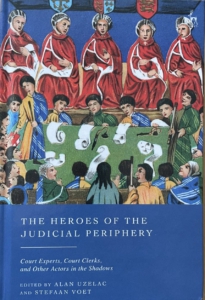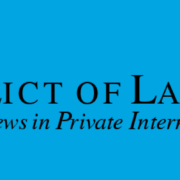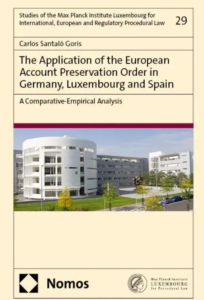 Last month the book The Heroes of the Judicial Periphery: Court Experts, Court Clerks, and Other Actors in the Shadows, edited by Alan Uzelac and Stefaan Voet (Hart/Bloomsbury Publising, 2025) was published. The book highlights the role of perhaps less prominent, but nevertheless important actors in (international) judicial procedures from a national, comparative and/or international perspective.
Last month the book The Heroes of the Judicial Periphery: Court Experts, Court Clerks, and Other Actors in the Shadows, edited by Alan Uzelac and Stefaan Voet (Hart/Bloomsbury Publising, 2025) was published. The book highlights the role of perhaps less prominent, but nevertheless important actors in (international) judicial procedures from a national, comparative and/or international perspective.
The European Civil Justice Centre (Erasmus School of Law) hosts a seminar in collaboration with the editors to launch the book on 4th July 2025 from 10-12 CEST.
Discussions on civil justice mostly focus on procedural rules, and the role of courts, parties and lawyers. This book addresses other actors that are often overlooked in academic and policy debates. It assesses the role of court experts, court clerks and court staff, and other actors on the ‘judicial periphery’ who play an important role and often co-determine the pace, outcome, and tone of the judicial process.
The knowledge and skills of experts may be indispensable at times, but it is among the most expensive, complicated and time-consuming means of evidence. The judges adjudicate, but where experts are involved in the process, they have a decisive impact on the outcome of litigation. Therefore, a principal focus of the book is on experts and how they are appointed, managed, and remunerated across Europe and the world.
The editors will discuss topical issues highlighting these ‘actors in the shadows’ and key experts will present their ideas based on the key findings of the book chapters, followed by discussion.
Registration for free here (hosted through Eventbrite)
Speakers & program:
10.00 Opening and welcome: Xandra Kramer
10.05 Alan Uzelac & Stefaan Voet – Heroes of the Judicial Periphery
10.15 Juraj Brozovic – The Case of Judicial Advisors in Croatia
10.30 Camilla Bernt – Expert Evidence in Custody Disputes and Child Protection Cases
10.50 Discussion
11.05 Michael Stürner – Experts on Foreign Law in German Civil Procedure
11.30 Adriani Dori & Xandra Kramer – The Role of Third-Party Funders in the Shadow of the Procedure
11.45 Discussion




